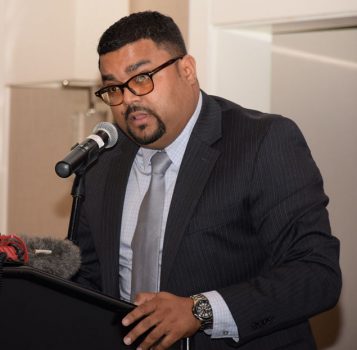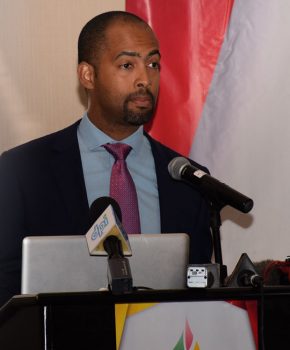As it prepares for the development of its oil and gas sector, Guyana has been urged to define its safety culture as early as possible.
“What I’m trying to suggest that it’s worth your while as a society to try and figure out what you believe in relation to the oil and gas industry and, in particular, safety in the oil and gas industry. You’ve got to take the time to figure that out now, so that you can build a safety culture that meets your society where it is,” Edward Braithwaite, Director and Principal Consultant at InCrEdible Safety Services Limited, a safety consulting firm based in Trinidad and Tobago, told the attendees at a public lecture organised by the Guyana Oil and Gas Association (GOGA) at the Guyana Marriott Hotel.

Brathwaite said that while there are many people who will say that safety is inconvenient and time consuming, safety is good business and the companies that are in better financial positions are the ones that get safety right.
“No matter what business or activity, when you have unplanned negative incidents, it costs you money and stifles your income stream. If you invest time and energy into getting it done right the first time, you can safeguard revenue and profits to invest in your business. An ounce of prevention beats a pound of cure,” he said.
With respect to the oil and gas industry, which he described as a cross-cultural workplace, Braithwaite said there is a need for a proper safety culture to ensure that risks are mitigated. He also pointed out that because of the different cultural backgrounds that interact daily in the oil and gas industry, great emphasis must also be placed on communication.
“It allows you the opportunity to, having identified potential weaknesses, put in programmes or strategies to try and bolster those, so that they don’t manifest themselves in a negative way,” he noted.
He pointed out that “where you come from matters” and he argued that each person’s cultural background influences the way they perceive situations, which can cause a lapse in communication a lot of times.
Meanwhile, GOGA CEO Bobby Gossai said that the lecture was part of the Association’s undertaking to provide public information to the country in order to understand topics as it relates to the development of the imminent oil and gas industry.

“The offshore oil and gas industry is among the most developed in the world. Although drilling and production are intrinsically hazardous activities, the early history of the early offshore oil and gas industry demonstrates priority given to production over safety and as a result constant pressure to improve huge investment made in these areas, particularly equipment, structures and personnel, as rapidly and as fast as possible. Hence, Guyana must ensure that it develops a safety culture from the very start,” Gossai told the gathering.
He said a safety culture is defined as the core values and behaviours of all members of an organisation that reflect the commitment to conduct business in a manner that protects people and the environment.
He stated that there are nine characteristics or elements for a “robust” safety culture : leadership commitment to safety values and actions; respectful work environment; environment for raising concerns; effective safety and environmental communications; personnel accountability; inquiring attitudes; hazard identification and risk management; work processes; and continuous improvement.
However, while there is no single definitive set of elements that constitutes a safety culture, he said that the various versions often overlap considerably and, therefore, the local safety policy must ensure that it encompasses all of the characteristics that were listed.
“Despite the many definitions of safety culture, overall consistency across industries regarding the essential elements of such a culture enables the establishment of norms to facilitate clear communication across systems and across industries,” Gossai said, while adding that a robust safety culture permeates the entire industry.
As a result, he said, the safety culture has to flow from the top of the industry with the operators, contractors and subcontractors to all the workers in the offshore locations, while being supported by the regulatory environment.
Gossai noted that safety culture should not be seen as a destination but something that needs to continuously adapt, evolve and be redefined over time, just as the oil and gas industry does. He added that creating a strong safety culture requires alignment, effort, resources and time and research has shown that the safety culture is significantly enabled by leaders’ commitment to safety actions and actions that represent accountability to safety.
Consistent safety communications and attitude through the industry, diligent hazard identification and swift management of identifying hazards are also aspects that make safety culture strong.





